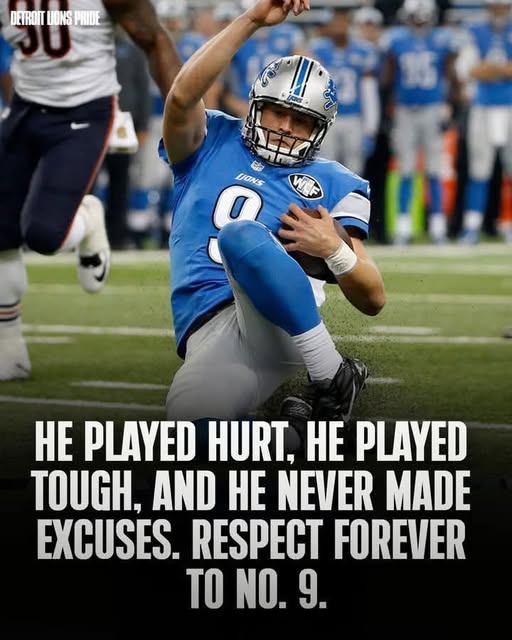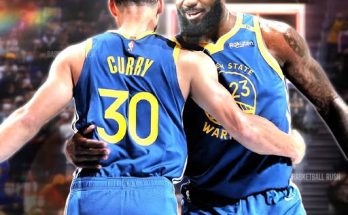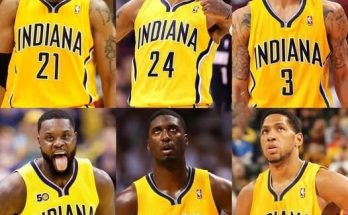For 12 seasons, Matthew Stafford wasn’t just the quarterback of the Detroit Lions — he was the Detroit Lions. In a city known for its grit, toughness, and never-say-die attitude, Stafford embodied everything Detroiters respect. He was the face of a franchise too often defined by heartbreak, yet through it all, he stood tall, delivered heroic moments, and left an indelible mark on a football-hungry city that desperately needed someone to believe in.
From the moment he was drafted No. 1 overall in 2009, expectations were sky-high. Detroit was a franchise in ruins, fresh off an infamous 0-16 season. Stafford didn’t walk into a stable situation — he stepped into the fire. And he never once ran from it.
The Numbers Behind the Legacy
In purely statistical terms, Stafford’s achievements in Detroit are nothing short of remarkable. Over 12 seasons, he threw for 45,109 yards, 282 touchdowns, and 144 interceptions. He became the franchise leader in nearly every major passing category, eclipsing legends like Bobby Layne and Joe Schmidt in the record books.
But numbers alone can’t define Stafford’s impact. Football is an emotional game, and Stafford was a player who made fans feel. He gave Detroit hope in a time of darkness. And while wins were sometimes elusive, Stafford’s arm talent, toughness, and fourth-quarter heroics brought the city moments of pure magic.
Playing Through Pain, Never Making Excuses
Perhaps no quarterback of his generation played through more pain with less complaint than Stafford. He was famously tough, grinding through injuries that would sideline most players — broken ribs, dislocated fingers, sprained ankles, back fractures — you name it, he likely played through it.
One of the most iconic moments of his career came during a 2009 game against the Cleveland Browns. With seconds left, Stafford separated his shoulder, grimaced in pain, and was being escorted off the field. But after a Browns timeout, Stafford waved off the trainers, ran back onto the field, and threw the game-winning touchdown. He was just a rookie. The moment is forever etched in NFL Films lore, and it gave fans a glimpse into the kind of competitor he was going to be.
The 2011 Breakout and a Comeback for the Ages
2011 was a pivotal season — a turning point for both Stafford and the Lions. That year, he started all 16 games and threw for over 5,000 yards and 41 touchdowns, leading Detroit to a 10-6 record and their first playoff appearance since 1999. He engineered multiple thrilling comebacks, including a signature victory over the Dallas Cowboys where he pulled off a 24-point comeback on the road.
Stafford’s fourth-quarter poise became a trademark. In fact, he led the NFL in comeback wins multiple times throughout his career. Whether the Lions were down by 3, 10, or 20, as long as #9 was under center, fans never gave up hope. That speaks to the kind of belief he inspired.
Battling Through Dysfunction
It’s no secret that during Stafford’s tenure, the Lions were often mired in mediocrity — or worse. Coaches came and went. General managers were replaced. The offensive line was inconsistent. The run game was often nonexistent. And the defense? Frequently ranked near the bottom of the league.
Yet Stafford never publicly complained. He never demanded a trade. He never blamed his teammates. He simply showed up, week after week, with his helmet on and a fire in his eyes.
And despite being surrounded by instability, he still produced — throwing for over 4,000 yards in 8 different seasons and becoming the fastest quarterback in NFL history to reach 40,000 career passing yards at the time.
A Leader in the Locker Room and the Community
Off the field, Stafford was just as impactful. He and his wife Kelly Stafford made Detroit their home and gave back generously. From donating $1 million to help rebuild local education programs to supporting cancer patients and COVID-19 relief efforts, the Staffords became pillars of the community.
In the locker room, teammates revered him. Players frequently cited his work ethic, his quiet leadership, and his accountability. Even amid losing seasons, Stafford commanded respect — not through bravado, but by example.
A Bittersweet Goodbye
In 2021, after 12 seasons and no playoff wins, Stafford and the Lions agreed it was time for a fresh start. Stafford was traded to the Los Angeles Rams in exchange for Jared Goff and draft picks. It was the end of an era — one filled with loyalty, heartbreak, and moments that still give Detroit fans chills.
The move gave Stafford something he always deserved: a legitimate shot at glory.
Winning It All in L.A. — and Doing It for Detroit
In his very first season with the Rams, Stafford proved what Lions fans had known all along — he was a championship-caliber quarterback. He led the Rams to a 12-5 record, threw for over 4,800 yards and 41 touchdowns, and then powered through the playoffs with a string of gutsy performances.
In Super Bowl LVI, Stafford led a game-winning drive late in the fourth quarter against the Bengals, delivering a touchdown pass to Cooper Kupp to seal the win. It was the culmination of 13 years of hard work, grit, and overcoming adversity.
Though he wore a different uniform, Detroit rejoiced. Stafford’s triumph felt like a win for the Lions, too. Social media lit up with posts from Lions fans crying tears of joy, proudly claiming, “He’ll always be our quarterback.”
Because Stafford didn’t just leave behind stats — he left behind love.
The Legacy: A True Warrior in Honolulu Blue
Matthew Stafford will go down as the greatest quarterback in Lions history. But more than that, he will be remembered as one of the toughest, most resilient players the NFL has seen in the modern era. He gave everything he had to a franchise that often didn’t return the favor. But he did it anyway — with heart, with humility, and with honor.
In Detroit, where toughness and loyalty are currency, Stafford became royalty. Every big hit he took. Every comeback he led. Every moment he refused to quit — it all built a bond with the city that can’t be broken.
For those who watched him on Sundays, Stafford wasn’t just a quarterback. He was a symbol of what Detroit stands for: resilience, pride, and heart. He made us believe when belief was hard to find. He made us cheer, scream, cry, and hope.
Will #9 Be Retired?
It’s a question that will stir debates for years to come: Should the Lions retire Matthew Stafford’s No. 9?
For many fans, the answer is simple — yes.
Even though playoff wins eluded him in Detroit, his impact transcended box scores. Retiring his number would be a recognition of his legacy: not as a Super Bowl winner elsewhere, but as a true Lion who stayed loyal through the leanest years, gave everything to his team, and asked for nothing in return.
No matter what happens, one thing is certain — Stafford’s name will forever be woven into the fabric of Detroit sports history.



